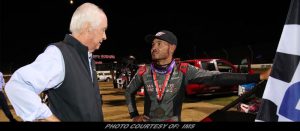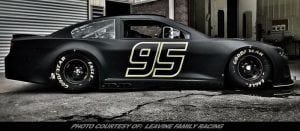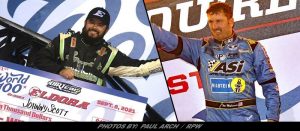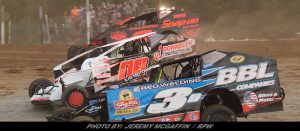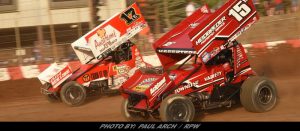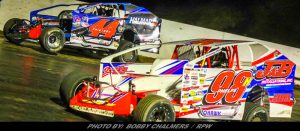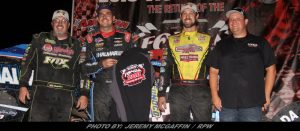Rich Tobias Jr. To Be Honored As Hall Of Fame Mechanic
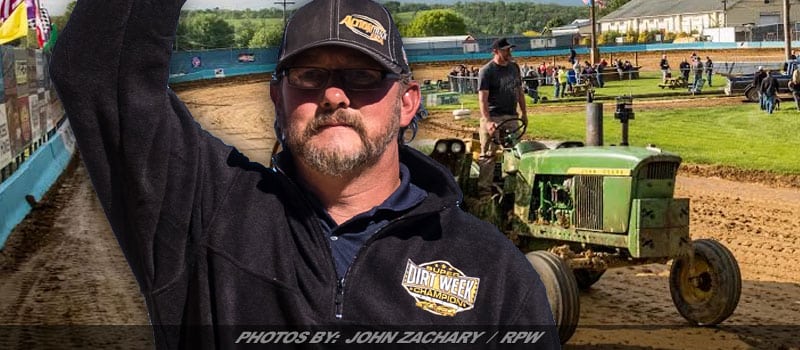
Column By: BUFFY SWANSON / NORTHEAST DIRT MODIFIED HALL OF FAME – WEEDSPORT, NY – For his many contributions to the sport, Pennsy entrepreneur Rich Tobias Jr. will be honored with the distinguished Mechanic/Engineering Award during the 2017 Hall of Fame ceremonies, to be held on Monday, July 10, at the Northeast Dirt Modified Hall of Fame and Museum on the grounds of Weedsport Speedway in New York.
The youngest son and namesake of Hall of Fame driver Dick Tobias embodies the definition of a Renaissance Man. At age 50, he has done it all: Built Modifieds in his family’s Lebanon, PA, speed shop. Driven race cars to historic victories (most notably, the big Syracuse DIRT Modified classic in 1992, and USAC’s 2003 Ted Horn Memorial at the DuQuoin Fairgrounds mile). And designed, built, organized, promoted and commandeered a couple classes of small cars that have taken off like a NASA space launch.
Tobias was only 12 when his famous dad was killed in a USAC crash at the Flemington Fairgrounds. Last in line to the throne, Rich pieced together his own deal when he was old enough to drive, as brothers Ronnie and Scott and brother-in-law Paul Lotier raced the Tobias Speed Shop house cars.
He was a 17-year-old kid, a lanky 150 pounds, when he made his driving debut in a Winged Sportsman he built himself. In fact, Tobias built almost every car he has ever driven — including the winning Syracuse Mod and USAC Champ Car. And none of those creations were run-of-the-mill.
While working at the speed shop, he started some serious thinking about where the sport as a whole needed to go. “People would come in, looking to get started in racing. At that time we were a Stallard dealer for Micro Sprints,” Rich remembered. “I kept seeing guys spending their entire paychecks every week, just to race. I thought there had to be a better way.”
So Tobias pulled out the drawing board, starting from scratch with a very specific checklist in mind. The car had to be simple by design. It had to fit in the back of a pick-up truck. It had to be strictly regulated so that no team could outspend another. And the price tag had to come in at $7,000 complete.
The Tobias Slingshot — a four-coil car with a 58-inch wheelbase, 600cc Briggs & Stratton engine and a Modified-style body —was unveiled in March 1999, with four of them running an exhibition at Borger’s Speedway. By the end of that year, Rich had constructed and sold more than 100, and introduced the class at seven tracks.
The economy Slingshot provides a foot in the door for both young novices and older racers looking to downsize. “Instead of running a Sportsman or Modified at Bridgeport, for the same amount of money the driver and his whole crew could get Slingshots — and they could all have fun,” Rich justified.
He is proud of the fact that a number of today’s young driving stars (“Ryan Smith, Anthony Perrego, Tyler Dippel, Larry Wight, Ryan Phelps, Lucas Schott,” Rich rattled off) came out of the Slingshot ranks.
Tobias is the sole distributor of Slingshots and their components, and mass-produces hundreds of parts and pieces at a time, keeping costs low. He also sets the rules, maintaining a close eye to ensure continuity and consistency across the board. He controls every aspect of the program — from manufacture to marketing to management.
Until 2002, Tobias worked out of the old speed shop in Lebanon, then found backers in Steve Weirich and Mario Rotondo, who provided enough financing for him to move out and start up Speedway Entertainment.
While the Slingshots were taking off — at tracks in 10 states and two Canadian provinces — Rich realized there was another niche that needed filling, and got out a clean sheet of paper.
“It had to have safety built into the design — a bigger cockpit, torque-tube type driveline, fuel cell not hanging off the back of the chassis,” Tobias ticked off the checklist. “Simple construction, to build cheaply. Easily repaired. Adaptable to both dirt and pavement. And open, so the fans can actually see the driver.”
This has been Tobias’ forte: His ingenious ability to think outside the box to fabricate what is needed, not just what is already there.
The SpeedSTR — essentially a self-starting Midget with a four-cylinder Mopar motor — hit the track in 2008. With Rich’s passionate promotion, he lured a lineup of A-list talent to rally around it: Ray Evernham, Billy Pauch, Kenny Brightbill, Rick Eckert, Brian Montieth and Frank Cozze among them.
But Tobias wasn’t satisfied with reinventing the wheel; he wanted to realign racing as we know it. To that end, he acquired his own track in 2012, turning the old Kutztown Fairgrounds into Action Track USA and the hottest weeknight ticket in the region, paying Modified-comparable purses to the USAC-branded SpeedSTRs.
“We proved we can entertain people — with a car that costs a third of the price of a Modified or a Sprint Car,” Rich said of his cutting-edge model at Kutztown. “That’s what most fans miss. The sole premise is the ability of this car to entertain people.”
And keep things affordable for the competitors. But you don’t use the “A” word around Tobias. “I don’t want to try to sell them ‘affordable racing,’” he scoffed. “Fans don’t want to feel like they’re seeing the lesser of something. They don’t want to see a Limited Monster Truck. They want a real Monster Truck!”
But Tobias keeps coming back to the numbers. “If a SpeedSTR costs $20,000 and a Modified costs $40,000 — times 20 cars, that’s $400,000 more on that race track. Is that Modified show $400,000 better than my show is?” he reasoned.
Much of Tobias’ thinking is a throwback to his father. “When Kenny Weld came out with his first Modified, my dad saw that costs were escalating and knew something had to be done. He envisioned a small-block spec car. My brother Ronnie tried it out at Reading. But it never came to fruition in his lifetime,” Rich reflected on his father’s concept.
The SpeedSTR “is exactly what my dad would have liked,” said Tobias — a race car within reach of the common man, easy to work on, with rules that ensure a level playing field and put the show back in the hands of the drivers. “That was his idea,” Rich reiterated. “I guess it’s bred into my DNA.”


